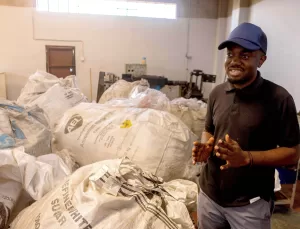He started approaching medical facilities, offering them a service providing proper waste disposal.
How COVID helped this man fight climate change

Tafadzwa Ufumeli, bird story agency
On a Saturday in Waterfalls, a suburb five kilometres south of Harare’s Central Business District, Stuart Nyakatswau is alone in a warehouse, surrounded by large garbage bags and machines.
His company, Wastiinova, recently moved into the facility and he is busy cleaning and preparing for the busy week ahead.
Despite having 19 employees, he still prefers a hands-on approach and his business is, to him, more than a money-making venture.
“It is my little way of making the world better,” the thirty-year-old told bird story agency during a recent interview.
Wastiinova is a waste recycling company. Nyakatswau started it in 2017, after coming across a newspaper article.
“One day I was reading a news story where a child had picked up a test tube full of blood at a rubbish dump and had mistaken it for lipstick. It felt wrong, and I felt I needed to do something as someone in the health sector,” he said.

At the time, he was no longer feeling gratified at his job as a laboratory technician at a local laboratory. He started approaching medical facilities, offering them a service providing proper waste disposal. Medical waste usually comprises syringes, gloves, bandages, human tissue, cultures and other biohazard waste. It cannot be disposed of in the same way people handle the domestic waste.
“At the beginning, I was hiring trucks and I was collecting waste from clinics, hospitals and taking them to incinerators at major hospitals,” he said.
This was a challenge due to the low number of incinerators in Zimbabwe. In Harare, only major government hospitals, including Parirenyatwa, Sally Mugabe Hospital and Chitungwiza Hospital, have industrial-scale incinerators.
“The incinerators kept breaking down. The one at Parirenyatwa broke down. We started going to Sally Mugabe hospital. In no time it broke down as well,” Nyakatswau said.
The remaining incinerator at Chitungwiza hospital was soon to follow. As someone who was already concerned about the environmental effect of burning waste, however, he recognised these setbacks as an opportunity.
“Every time we would burn waste, my heart would get heavy. So when the incinerators kept breaking down, I asked myself – is there another way?”
The inquiry triggered a lightbulb moment for Nyakatswau.
“As I was pondering my next move. I remembered that surgical instruments are used and are sterilized for use on the next patient, and the same could apply to medical waste,” he said.
At the time, business was picking up and he was realizing some profit, enough for him to make some savings.
“I decided to buy an autoclave, a machine which sterilizes the waste and makes it safe for handling during the recycling process,” he said.
What made the idea even more attractive was how energy-efficient autoclaving waste is, compared to burning.
“Incineration uses 1200 degrees Celcius to burn waste, so if we could find an alternative that reduces the heat… Sterilisation uses 124 degrees Celcius and high pressure. That became our next goal… to replace incineration with sterilization,” he explained.
That was in 2019.
As he made the investment, dipping into personal savings, he had no idea of the challenges that lay ahead. The arrival of COVID-19 meant that the proper disposal of medical waste was no longer a luxury for medical facilities, but a necessity. The correct disposal of accessories used in managing clinical cases became a matter of national importance.
Though the world was under distress, for Nyakatswau and Wastiinova, the wave of medical waste became both a problem and an opportunity.
“We had to push to increase more shifts and work on weekends. When we were not able to meet the demand we would sub-contract,” he said.
It was from this spike in business that Nyakatswau’s company made further investments, solving some of the company’s biggest headaches since venturing into business, like transport.
They bought their own vehicles, which meant they were no longer hiring trucks to move clients` waste around.
“People have always associated waste with dirty trucks. We bought two brand new Quantums, we branded them well and it raised our stock on the market. People associated our brand with status,” Nyakatswau said.
While COVID-19 regulations have eased in Zimbabwe and medical waste is no longer being created at the same rate,
“Now that COVID-19 is gone, things are now going back to normal. People are now spending the whole day with the same masks. At clinics, gowns are no longer compulsory,” he said.
However, Nyakatswau said the past two years have left the company with a significant footprint. And less pressure has allowed the company to think about value addition.
“In the past, all the plastic and other waste we would get, we would sell to people who export the waste to South Africa for recycling,” he said.
So Nyakatwau invested in machinery that would allow the company to perform its own recycling.
“It melts the plastic. We separate the plastic by colour. We melt the plastic, turn it into strands and then we grind them into pellets,” said Nyakatswau.
The pellets can be used to make bin liners and plastic chairs. Again, that offers an opportunity.
“We are in the process of importing a machine that manufactures bin-liners,” he explained. His company also handles confidential waste like medical records.
Despite the temptation to char the documents into ash, they simply shred them incisively before selling the shreds to those who recycle paper.
They have a zero-burn policy, which Nyakatswau says they are implementing with 95 percent efficiency.
“Ninety-five of the waste we collect, we recycle. We could achieve zero burning, but there are things that according to our regulations and ethics we burn. In Africa when there is a stillborn, you have to burn, lest people get worried,” he said.

“So, we are still burning pathological waste, due to the beliefs of our people. But everything else we are recycling,” Nyakatswau added.
Plastics offer considerable potential rewards.
“We commissioned a local company to design for us two machines, one that makes plastic tiles and one that makes foot soles. I think they will be done in a few days,” Nyakatswau explained.
During the course of the journey, the company has won a number of accolades, the most notable of which was the 2018 Green EnterPRIZE award for Outstanding Business in Waste Management in Zimbabwe.
He used the US$5,000 in prize money to fund the construction of a storage facility he was using. During the same year, AMREF Health Africa identified Wastiinnova as one of the top six emerging health startups in Africa.
The company was also listed among the top nine Global Startups in Medical Waste Management in 2019 by an organisation called Recycling Startups.
“There was a time I was interested in winning awards. But now we are focusing more on growth. If the awards come, we are happy. But if they don’t, we won’t be worried, as we are focusing on growth,” he said.
That growth strategy includes expansion across the continent. The company’s logo is designed with 36 green dots, which represent the countries they intend to venture into. For each country they enter, a dot on the logo will turn orange.
So far, there are two dots on the logo which have turned orange, representing Zimbabwe and Rwanda.
“We have already entered the Rwanda market at a pre-revenue stage. We are not yet making revenue but we have a website we use to push education and training… While we are doing that, we are building a database of the market and once are convinced that we will get enough business we are setting up base there,” said Nyakatswau.
Besides just collecting and putting waste to good use, Nyakatswau is also seeking to venture into research. The laboratory sciences graduate is now also studying the correlation between incinerating medical waste and colorectal cancer.
“Whatever we, do we always have to make sure we are making the world a better world. If you incinerate waste, there are particles that increase. We believe there is a correlation between high cases of colorectal cancer. We are hoping to do research to validate that,” he said.




